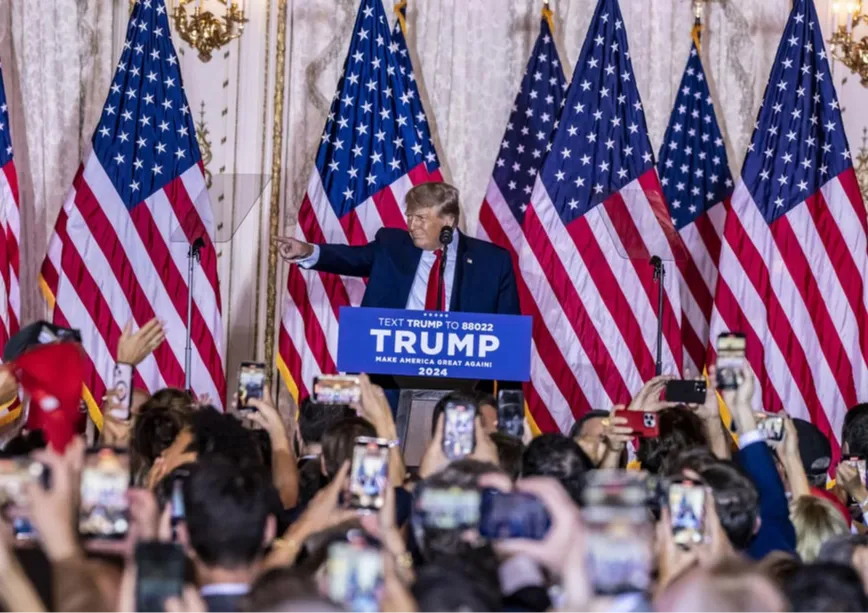-
CENTRES
Progammes & Centres
Location
Trump’s approach to transatlantic security, the US’s allies in the Indo-Pacific, and security concerns in West Asia will be shaping his vision of international security

Riding high on successive victories in Iowa, New Hampshire, and South Carolina, the prospective Republican presidential nominee, Donald Trump, appears to have solidified his position. His lead over Democratic incumbent President Joe Biden in most polls should serve as a significant indicator for the rest of the world to brace for a foreign policy that may diverge substantially in approach and style from what it is accustomed to. If Trump secures the presidency, his ‘Make America Great Again’ (MAGA) slogan would now apply to a global landscape vastly transformed since his departure from office four years ago.
Offering a glimpse into what shaped his foreign policy in his first term, Trump withdrew from the Joint Comprehensive Plan of Action (JCPOA) and the Trans-Pacific Partnership (TPP) during his presidency, and although he issued threats to United States (US) allies, he refrained from either curtailing funds or withdrawing from NATO altogether. In a potential second term, he is likely to reinforce some of these missed opportunities, congruent to his own politics and campaign promises. He may now find stronger justification for curtailing NATO funds, considering the US contributed close to 69 percent of NATO's funding in 2020, and for withdrawing from global financial commitments, particularly combat and peacekeeping engagements which drain US resources. Donald Trump's argument will likely focus on portraying the US's disproportionate assistance to NATO as unfair, thus advocating for the need to achieve trans-Atlantic parity in financial support to NATO. Amongst a few other steps that shaped Trump’s foreign and security policies, the Trump administration had previously ordered a hasty troop withdrawal from Afghanistan and imposed a travel ban targeting specific countries.
Donald Trump's argument will likely focus on portraying the US's disproportionate assistance to NATO as unfair, thus advocating for the need to achieve trans-Atlantic parity in financial support to NATO.
Trump’s recent statement indicating that he would encourage Russia to attack NATO members should they fall short of their financial obligation is the latest indication that his policies may be primarily rooted in an ultra-conservative MAGA perspective of US foreign policy.
Besides the fact that there may be a comparatively favourable view of Russia within the Republican camp compared to the Democrats, Trump's approach to allies, partners, and friends has consistently prioritised US interests abroad, even at the cost of structural constraints, to strengthen and consolidate at home.
As US foreign policy has evolved, a notable characteristic has been the ongoing pursuit of dominance and influence worldwide, which laid the groundwork for the liberal international order for much of the last century. However, in the past decade, this order has been challenged as great powers themselves have sought to alter the status quo in both Europe and Asia. This has required recalibrations on the part of the US, both abroad and at home. A key aspect of this adaptation has been a disjointed policy approach, whereby the US maintains a dominant force posture globally but focuses more intensely on certain domains. The Indo-Pacific region has emerged as a central strategic focus in that respect, signalling a shift from a security emphasis on West Asia to a joint vision encompassing the Pacific theatre and the broader Indian Ocean region. This approach is underscored by the belief that as more countries in the region increase their capacities, there should be a natural inclination for them to play a greater role in security provision and burden-sharing in areas such as regional security, health, human resources, disaster management (HADR), and other non-traditional aspects. India’s recentring in the Indo-Pacific security paradigm has been a pre-eminent example in this churn.
A key aspect of this adaptation has been a disjointed policy approach, whereby the US maintains a dominant force posture globally but focuses more intensely on certain domains.
Trump's vision of global security contradicts some fundamental and structural ideas of US security policy and its broader foreign policy worldwide which may have withstood time-tested circumstances. Three key factors underpin Trump's conception of how security policy should be reshaped in a changing world. The first arises from domestic compulsions, characterised by the otherisation of immigrants and hyped homeland security driving a domestic escalation of security measures, particularly in the aftermath of 9/11 attacks. This sentiment has also led to policies such as the call for the construction of a wall on the US-Mexico border and a deeply ingrained anti-immigrant sentiment prevalent across US societies. The combined impact of conflict and immigration, on the US domestic political scene and a visible strain in the years since Trump left office, is bound to impact decision-making under a potential second Trump presidency.
The second factor is the gradual erosion of the belief in the supranational institutional structures of the post-World War II order within a section in the US, as indeed in other parts of the world. There is an evident strain of Republican thought which has questioned the relevance of established economic and security rationales of the last century to the current one. The rise of China and “the rise of the rest” have stretched the fundamental beliefs in institutions and the global order, posing challenges to stability and state behaviour, ushered by new dimensions such as grey zone tactics and irregular warfare. These transformations have gradually eroded the liberal international order, necessitating adaptation by states, most notably the US. Trump's persuasion that individual states and allies bear the primary responsibility for their own security and that the US cannot be the sole guarantor of global security due to its own constraints, aligns with this understanding. Most importantly, these changes are transient and likely to persist in a transitory phase for the next decade.
The rise of China and “the rise of the rest” have stretched the fundamental beliefs in institutions and the global order, posing challenges to stability and state behaviour, ushered by new dimensions such as grey zone tactics and irregular warfare.
Donald Trump’s approach to transatlantic security and broader international security may be pre-empting a post-liberal international order, the structures of which may still be taking shape and are far from complete. Trump’s recent threat to European countries apropos the funding of NATO is geared to consolidate US’ position and prop up transatlantic partners to do more, while the US could well be diverting resources to focus more specifically on bolstering capacities at home. While Trump's message to NATO partners may be interpreted as an urging for increased contributions to collective security in the transatlantic region as America scales back its own involvement, it underscores Trump's belief that the era of sole American leadership in collective security may have passed. Instead, he suggests that while America may lead, it should not shoulder the entire burden. These hues are also evident in US operations in the Indo-Pacific, where the US has harped on fostering connectivity, infrastructure, and upholding a rule-based order as a collaborative approach from other regional partners. As such, Trump’s concept of global security may not centre on US leadership per se, but rather on a leadership guided by collective efforts and a prioritisation of US concerns. However, achieving such a balance may prove challenging considering that any US leadership will need to be complemented by exemplary actions and a reassurance of the US security umbrella as a last resort to counter any threats to the liberal international order.
If Donald Trump does indeed assume the next presidency, three domains could guide his approach to international security. The case of transatlantic solidarity, especially how US supports NATO if the Ukraine-Russia war drags on, will likely become the barometer of Trump’s attitude and commitment to international security. Another test would be how the US under Trump treats its treaty allies, especially allies like Japan, South Korea, and Australia in the Indo-Pacific yet another . And finally, the third key factor in shaping Trump’s vision of international security would be dependent on how resolute the Trump presidency will be when it comes to taking additional security roles in West Asia and Africa amid growing security concerns in these regions.
Vivek Mishra is a Fellow with the Strategic Studies Programme at the Observer Research Foundation
The views expressed above belong to the author(s). ORF research and analyses now available on Telegram! Click here to access our curated content — blogs, longforms and interviews.

Vivek Mishra is Deputy Director – Strategic Studies Programme at the Observer Research Foundation. His work focuses on US foreign policy, domestic politics in the US, ...
Read More +